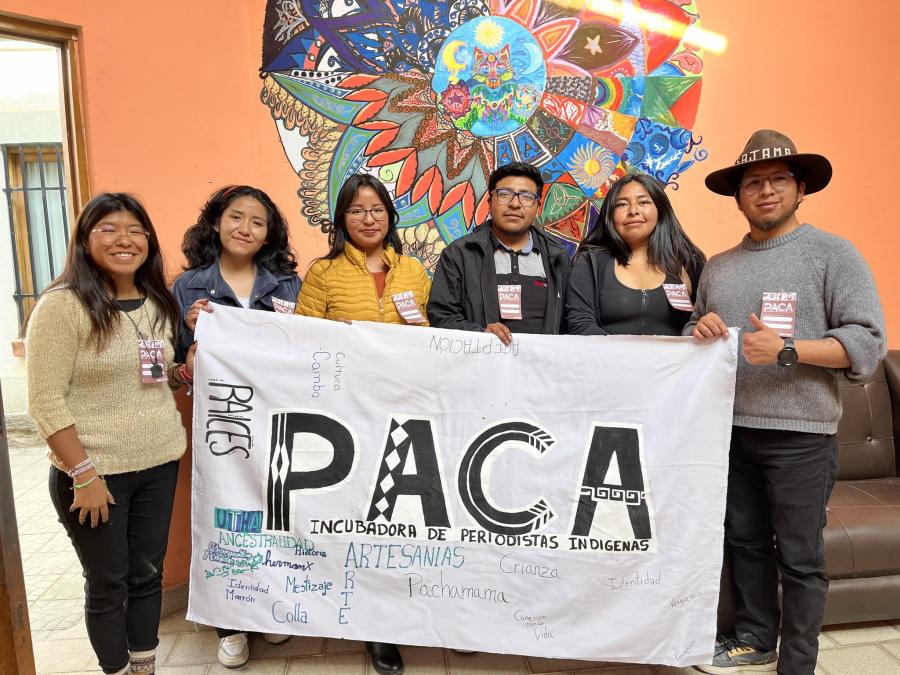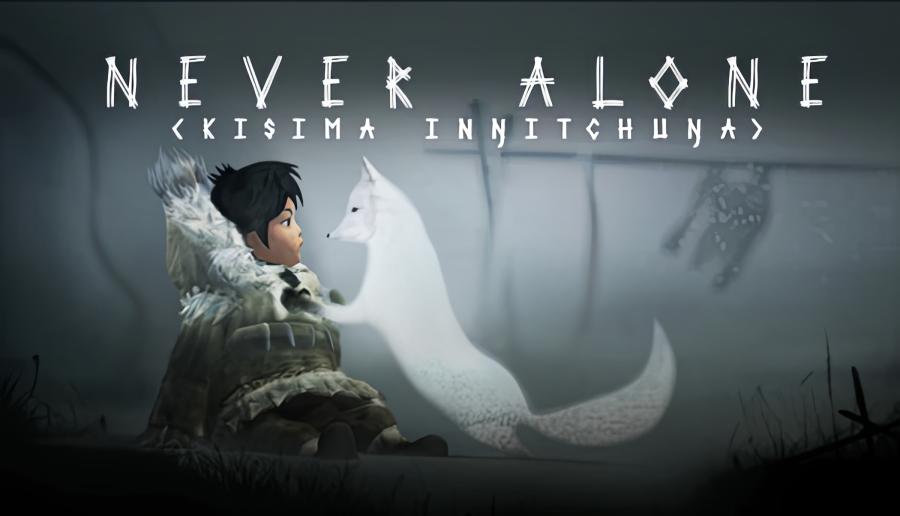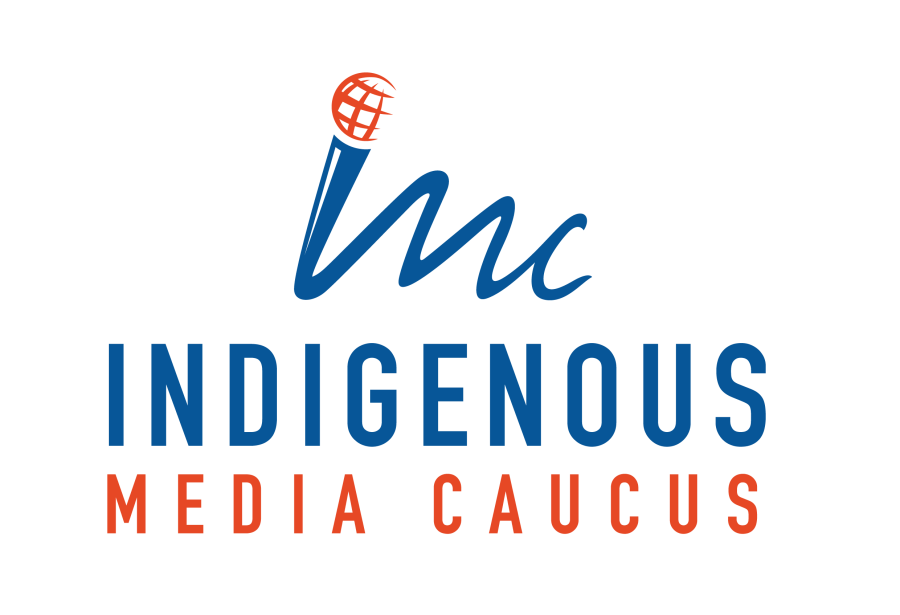Shania Sontariakon/Sandoval-Cross, 26, is Kanien'kehá:ka (Mohawk) from Kahnawà:ke, Canada, and Afro-Maya from Axaja, Guatemala. They were born and raised in unceded xʷməθkʷəy̓əm, Sḵwx̱wú7mesh, and Sel̓íl̓witulh territory by strong Mohawk matriarchs and political refugees with predominantly Latin American and diasporic Asian communities shaping their relation to food, community, and cultural norms. They have been working with Indigenous youth for more than 10 years in culturally relevant and resurgent practices such as art, language, and land-based pedagogy, dedicating their work to creating and maintaining safe spaces for Indigenous Two-Spirit and queer youth. They currently reside in Vancouver, BC, and are pursuing a degree at the University of British Columbia with a major in First Nations and Indigenous Studies with a minor in Gender, Race, and Social Justice. Cultural Survival’s Nati Garcia (Maya Mam) recently spoke with Sontariakon/Sandoval-Cross.
Cultural Survival: How do you identify?
Shania Sontariakon/Sandoval-Cross: When I'm with somebody who's not from my communities or from a queer community themselves who doesn't identify as queer, I use exclusively they/them pronouns. But when I'm with folks in my communities, I'm okay with she/they. I think there are different understandings of gender and sexuality that come along with the pronouns, so they change based on what's happening.
CS: What are the terms in your languages or cultures that express your identity, if they exist?
SSC: In Spanish, there's a lot happening in terms of gender inclusive language, like putting an ‘e’ at the end of things rather than an ‘o’ or an ‘a’. But when it comes to having to navigate that in terms of older generations, like with my grandmother, sometimes it's not always safe because of laws and religious upbringings and patriarchy due to settler colonialism that is very present within communities. So when I'm in a situation where I know I have more privilege in terms of how I present as feminine, and also being from Canada and being somebody who has been around a more accepting environment, I tend to push those narratives in the ways that I speak. But it is hard, and sometimes you do feel like you're compromising your own identities in order to be in certain cultural spaces and with certain folks. Sometimes I just have to go by ella and use all the feminine [conjugations].
CS: Tell us about your journey of discovering your identity, from how you grew up to being able to share your story here with us.
SSC: In terms of being Kanien'kehá:ka (Mohawk), I was really lucky that being queer was super accepted. My grandpa is queer; he was bisexual. A lot of my family are queer. I have some sisters and some siblings that are also queer. So, on that side of the family, it was a lot easier, and it was never a subject of concern or being fearful of having to come out. It was just, ‘here is my girlfriend’ one day and these are my pronouns, and that was totally fine. But in terms of coming from my Afro-Maya family where they're here as political refugees, it's scary for my dad to even say, ‘I'm Black and I'm Indigenous.’ It's always, ‘I am Guatemalan,’ and not going into the very visible identities that he also carries. For him, having dealt with his traumas and his PTSD through becoming a fundamentalist Christian, my queerness was never something that was safe to talk about up until recently. I was 25 when I finally came out to him, and that was after about a decade of him seriously doing his own healing journey and me feeling safe enough to do that.
Growing up, I remember seeing certain family members that I knew they were queer, but they would never come out and they passed away being in the closet. The only grandparent that I have left is my dad's mom. She's thankfully very accepting, and that's because she works for people who are gay or trans. She's experienced folks in our community and so she was more understanding. But she still hopes I'll have a husband one day. And even though I told her that's not likely, it's not something that prevents us from having a relationship, thankfully.
CS: Did you grow up within multiple communities, or did you find yourself belonging more to one particular community? How has that experience influenced the strengthening of your identity?
SSC: I definitely grew up in multiple communities. My parents were quite young when they had me, and I was raised in the projects in Vancouver in housing that was all Latino people. And then I also grew up in a neighborhood that was predominantly East Asian and South Asian. We'd go home every Christmas for the first couple of years of my life and it was very much cis-hetero, very religious. But community has always been important, and it's always been very loving and supportive and reciprocal. At the time I was growing up, there were a lot of folks from all over Latin America coming here as refugees. There is a really beautiful sense of community and culture and a mixing pot of all of these different nations coming together that raised me in really beautiful ways. I think it definitely made it harder to be queer in those spaces because of the compulsory heteronormativity that's just fully ingrained in you. But having my matriarchal Mohawk side be present through my mom's mom and my mom, that really set up the foundation of who I was, despite the dominant culture I was around.
CS: What is the state of the 2SLGBTQIA+ rights in Canada?
SSC: I'm very privileged in terms of the rights that we have here and the fact that I can marry whomever I want to marry. On our passports, we now get to mark our gender according to us— It's not just male/female, which is great. But there's still work to do, especially for Indigenous folks here. If I was looking to have a child with my partner, our donor would have to be Indigenous in order for our child not to lose their “status” as Indigenous under the Indian Act and to be accepted into the community, it's still very complicated. The Indian Act, which determines our identity, is still very cis-hetero. 2SLGBTQIA+ rights are present, but it is easier if you are a settler. I am very privileged, especially living where I live in Vancouver; it is very queer. I am very lucky to be safe in that sense, whereas I know in Guatemala, I would not experience the same thing.
CS: What were the traditional practices and traditional ways of communicating or navigating being Two-Spirit?
SSC: I do not carry my traditional language, Mam. My great-grandmother was the last one to speak it, and she died when I was about three years old. In terms of our ways, I did have my birthright and purpose read to me. The name that my Maya family calls me is Nia, which is actually a Mam word. When I introduce myself and I talk about my pronouns, you can use ‘she’ only if you understand my cultural context, because we do have those Two-Spirits, we have those energies. I am somebody who has a very high feminine energy. Christianity has taken a lot away from that, and having Spanish be my first language and the language that my family speaks—other than words in our traditional language that'll come out here and there—the understanding of how we carry those spirits and how they balance, everything gets lost. It affects our family structures and the ways that we can relate to one another and the ways that we live our lives. The monolithic dichotomy is ingrained and is forced intergenerational at this point. Colonialism complicated things so much. This is definitely something I wish I had better language for because I have experienced it thoroughly. The best way for me to talk about it is simply through telling of my own experience. I was the first girl born into the family. In my identity and my names and my birthright and purpose, I am somebody who has a good balance, going into both [masculine and feminine] energies, even though the way that I present and lean into things is more within that feminine energy that we all hold.
CS: What documentation have you come across about 2SLGBTQIA+ Indigenous people from your Mohawk side?
SSC: Our queer people have always been there, and there is definitely a resurgence happening now. There's even a record of it when the Jesuits came into our communities. [There are] records where they talk about our Two-Spirit kin and how it was so unnatural to see a man be called a woman or two women living together in the sense. They specifically used Christianity to eradicate queerness in our communities and saw that as a threat.
There are great Indigenous academics right now doing this work, like Leanne Simpson and Sarah Hunt. There's a really beautiful and powerful Two-Spirit queer resurgence happening. It's beautiful, and it's affirming to see that work happen and to have those actual records coming out that we did exist. It's like the settler colonialism and Christianity and that assimilation and that indoctrination that has happened to our Nation, gaslighting us all, saying, ‘No, we didn't have queer people in the past. We didn't have Two-Spirit people.’ But we did. Here are the physical records of these colonizers coming in and making note of how weird it was to see this and how normal it was in our communities and the positions that our Two-Spirit folks held in community and in ceremony and in terms of being knowledge keepers and storytellers, holding all of that knowledge.
A lot of our communities have lost the words for what we call Two-Spirit folks—queer, lesbian, gay—because it wasn't safe to use that language when you had your Indian agents watching you or you were in residential schools. A lot of the time, the Elders or the community members that still hold the language don't use those words because of the trauma that they've gone through and the fear and the hurt that they associate with those words. They'll talk around it, or they'll mention it in a story, but they won't give you the actual word for it. So, there's a lot of work being done to figure out those words or even create new words. And that's kind of beautiful, just the mere fact that we are not static people, and we get to determine what these terminologies are, how our language still is living and can evolve to include the spectrum of folks that make up our community.
The Mohawk language is very gendered, unfortunately, but we are a matriarchal society so that challenges how cis-heteropatriarchy is so present and it allows for queerness to survive. Even though the language is gendered, it does not demand the same kind of heteronormativity from folks.
CS: If you could create a word that reflects your culture and complements your identity, what would it be?
SSC: I think that's a really beautiful question. I really appreciate that. In terms of my own Mohawk language, I prefer ‘queer’ because I think it encapsulates my gender and my sexuality and it doesn't demand a binary definition. It allows for the natural fluidity of sexuality and gender. When I think of the kinds of roles, I see presently for queer Two-Spirit folks in our community, they really are the leaders, the warriors. Because in my language, the word for warrior means the burden of carrying the peace. I think that's kind of who queer folks are in a way, because we truly are putting our bodies on the line for that equity and for that reciprocity for our community as a whole, not just in terms of our sexual and gender identities. There's a very nurturing and intelligent knowledgeable aspect to that identity as well. So, it would have to be something that talks about you being a warrior, but also is nurturing and kind, someone who is definitely a leader. I see a lot of my fellow queers in community carry those roles in really beautiful and humble ways. So, I wish that word existed, and I wish I had the language myself to be able to narrow that down because unfortunately, I do not know enough of my language to do that.
CS: Do you see any prominent issues that need to be addressed for 2SLGBTQIA+ folks in Vancouver? If so, what are they?
SSC: Definitely. Oh my gosh, do we ever have work to do around trans rights and support and gender affirming care. We do have support, but there are still a lot of barriers, and it also affects folks depending on their health. The perceived notion of what a healthy body is in order to receive these gender affirming surgeries and care is very colonial, and that needs to be deconstructed and challenged and completely rebuilt with a full spectrum of trans folks leading that movement and rewriting the laws of care. Also, in terms of having safe spaces that are not gendered, it's safe for queer folks as long as you're cis, but our trans and non-binary and gender fluid community members still very much struggle to find safe spaces. I often go into my workspaces, and the policies that are written are very gendered and very cis. It starts at the level of your everyday interactions in your communities, those policies that define you and where you are, and having to rewrite those as well as re-conceptualize how we see and understand the people that make up our everyday spaces.
CS: Where do you see yourself after your studies? What are your aspirations?
SSC: After my studies, I'd really like to go home. I'm very lucky that my community has a language program, so I'd like to become fluent. I think it's important for me to be able to be a good community member, and to make that change happen within and outside of my own community groups and communities that I consider myself part of, to have that more thorough understanding of self and community and land and culture that's held within language. And to also relate to folks who don't share the same experience that I do and who maybe don't know how queerness already exists within our language and our community, because it's always been there. They’ve just seen it from a different lens. I think it'd be interesting to see how language allows me to further explore those things.
But ultimately, my goal is to be on the land with our youth, whoever that may be—queer youth, Indigenous youth, BIPOC youth in general—and getting to participate in land-based pedagogy and making those connections with Elders and community, allowing that healing for our BIPOC youth to happen and for it to be inclusive, for it to be a queer and trans space, and for it to allow for all different ‘isms’ and others outside of settler colonial ways of knowing and being. I want to create and embody that space. Language, art, and culture has been what I've worked in for over 10 years now. So, I'd like to either start my own program or be able to work with a program that already exists to make those spaces more queer, more Indigenous.
CS: Is there a message that you would like to share with our readers who may find themselves in a similar process as you?
SSC: I'm still constantly reevaluating what gender and sexuality mean to me and how that is related to the intersections of my cultural identities. [So I would say], take your time and don't feel like you have to know it all in order to be yourself or to allow yourself to take up space in community. You don't have to be totally out if that's not safe for you, because sometimes it's not. Who you are is valid no matter what your life experience is, no matter how you identify. You will find a community wherever you are as long as you allow yourself to. [Your] lived experience is so valuable, and no matter what those hardships are, [you’re] going to inspire and uplift somebody else in their life.
We're all in some way reconnecting and constantly learning about who we are. We can't always know everything, but it's important to show up with your relatives, with your kin, and in your community spaces with humility. That's what I'm trying to do, because I'm still very much a learner in this life and I'm very grateful to be one and to have the love and care and supportive community that will allow me to do that.



